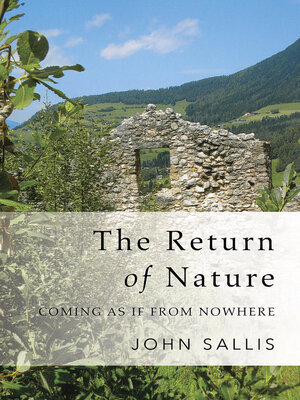The Return of Nature
ebook ∣ Coming As If from Nowhere · Studies in Continental Thought
By John Sallis

Sign up to save your library
With an OverDrive account, you can save your favorite libraries for at-a-glance information about availability. Find out more about OverDrive accounts.
Find this title in Libby, the library reading app by OverDrive.



Search for a digital library with this title
Title found at these libraries:
| Library Name | Distance |
|---|---|
| Loading... |
A reflection on the urgent need for a new philosophical understanding of, and relationship with, nature.
John Sallis dismantles the traditional conception of nature in this book of imagination and the cosmos. In the thought of Emerson, Hegel, and Schelling, Sallis discerns the seeds of an understanding of nature that goes against the modern technological assault on natural things and opens a space for a revitalized approach to the world.
He identifies two fundamental reorientations that philosophical thought is called on to address today: the turn to the elemental in nature and the turn from nature to the cosmos at large. He traces the elusive course of the imagination, as if coming from nowhere, and describes the way in which it bears on the relation of humans to nature. Sallis’s account demonstrates that a renewal of our understanding of nature is one of the prime imperatives we demand from philosophy today.
“Inspiring . . . [for] anyone looking to open up their mind to the reflection on other ways to live more closely in tune with their own nature and to the nature that is around them.” —Phenomenological Reviews
John Sallis dismantles the traditional conception of nature in this book of imagination and the cosmos. In the thought of Emerson, Hegel, and Schelling, Sallis discerns the seeds of an understanding of nature that goes against the modern technological assault on natural things and opens a space for a revitalized approach to the world.
He identifies two fundamental reorientations that philosophical thought is called on to address today: the turn to the elemental in nature and the turn from nature to the cosmos at large. He traces the elusive course of the imagination, as if coming from nowhere, and describes the way in which it bears on the relation of humans to nature. Sallis’s account demonstrates that a renewal of our understanding of nature is one of the prime imperatives we demand from philosophy today.
“Inspiring . . . [for] anyone looking to open up their mind to the reflection on other ways to live more closely in tune with their own nature and to the nature that is around them.” —Phenomenological Reviews







